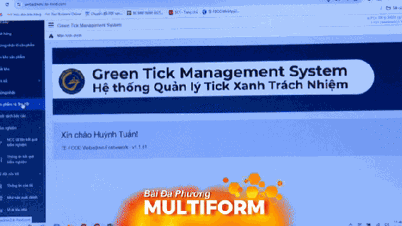(kontumtv.vn) – According to preliminary statistics, currently the number of Facebook and Zalo users accounts for more than 76 million users in Vietnam (accounting for nearly 70% of the population), in addition to a number of other social networks. These social networks are also spaces where scammers can easily steal property.
Stealing social media accounts, sending scam messages
According to statistics from the Ministry of Information and Communications , fraud by stealing social network accounts and sending fraudulent messages is one of the 24 most common forms of fraud in 2024.
Accordingly, the subjects will create fake Facebook, Zalo accounts... impersonating the owner or hijacking the social networks of individuals, then texting to borrow money, top up phone cards of their relatives and friends. At the same time, taking advantage of the policy of online account registration of banks, the subjects use photoshop software to edit information in the citizen identification cards collected in advance to match the full name of the hacked social network user, then print it out on photo paper, using this fake citizen identification card to register for an online bank account. This new fraud trick makes the victim mistakenly believe that it is the bank account of their relatives and friends.
During the investigation, it was found that the subjects were very young and knowledgeable about information technology; their methods and tricks were extremely sophisticated, professional, and gang-like. The subjects were highly vigilant, constantly changing locations, and mechanically using fake accounts to avoid being tracked by authorities.
Using AI to fake images and voices to appropriate property
One of the more sophisticated tricks used by scammers is deepfake – a technology that can simulate human faces, allowing users to create fake images and videos that look almost like real people. Many social media users have been scammed by fake videos, video calls or conversations of relatives created with this technology.
First appearing in 2017, deepfake was simply a tool to graft one person's face onto another, but until now, deepfake has been exploited to become a tool for fraud.
The growing development of deepfakes along with automated video manipulation will create many threats to society because image manipulation becomes easier and easier. This will be an opportunity for scammers to carry out their actions in a more sophisticated way, especially fraud in banking activities to appropriate assets.
Beware of scams
To recognize signs of fraud and preventative measures, the Ministry of Information and Communications recommends that people pay attention to the following signs:
Double-check suspicious messages or emails: If you receive a message or email from a friend on your friends list asking for sensitive personal information, money transfers, or urgent action, be cautious, as it may be a scam.
In particular, if the message contains urgent, threatening, or inappropriate requests, double-check to see if the message is actually from your friend.
Watch for sudden changes in language or writing style: If messages from friends have a sudden change in writing style, wording that is different from their usual style, or contain strange words, be more careful.
Check suspicious links shared in messages: If the link has suspicious signs such as an uncommon URL, is missing secure characters (https://), or redirects to unknown or suspicious websites, avoid clicking or accessing the link.
Don't give out personal information or login information: Don't give out sensitive personal information or login information (username, password) via text message or email. Scammers often use this tactic to take control of your account.
Verify information: If you receive a suspicious text or email from a friend, try contacting them directly through other means (phone, text, email) to verify that the message is from them. Do not use contact information provided in a suspicious message to verify.
Reporting and Warnings: If you notice any signs of a scam, report it immediately to the affected friend and report the incident to the social media platform or email service so they can take the necessary action:
Change your social media account password immediately and use a strong password, including uppercase, lowercase, numbers and special characters.
Report incidents via social media or other contacts such as phone, email.
Inform your friends and family on your friends list about the situation and warn them not to trust or respond to scam messages.
Also, always stay vigilant and follow basic security measures like not sharing personal information and passwords with anyone, not clicking on unknown links or suspicious messages, and updating security software regularly to avoid security vulnerabilities.
Faced with the risk that both images and voices can be faked, authorities recommend that people always be aware of verification; do not rush to access any links to avoid the risk of having their bank accounts or social media accounts hacked; limit your presence on social media, or set your account to private mode, only accept requests from trusted people to prevent and stop your image and audio data from being copied.
People absolutely do not post information online such as citizen identification number, home address, date of birth, phone number, children's names, etc.
In addition, if people receive blackmail calls with sensitive images or videos, they need to stay calm, verify and carefully research the origin of the images and videos. At the same time, they need to raise awareness of cyber security issues, learn the signs of AI fraud to avoid falling into the trap of property appropriation or revealing personal information for bad purposes.
People should not access strange websites, install unknown software, or software that requires high access rights to user information, memory cards, contacts, locations, photos, etc.
If you are being scammed online or in general, you should immediately notify everyone and report to the police at your place of residence.
Source: https://kontumtv.vn/tin-tuc/van-hoa-the-thao/nhan-biet-ve-lua-dao-su-dung-ai-de-tranh-sap-bay-tren-mang-xa-hoi




![[Photo] General Secretary To Lam attends the Digital Popular Education Symposium - Digital National Assembly](https://vphoto.vietnam.vn/thumb/1200x675/vietnam/resource/IMAGE/2025/9/13/43ebd93f0f5e4d98a2749dab86def7cd)
![[Photo] General Secretary To Lam attends the 80th Anniversary of the People's Court's Traditional Day](https://vphoto.vietnam.vn/thumb/1200x675/vietnam/resource/IMAGE/2025/9/13/ff42d08a51cc4673bba7c56f6a576384)
![[Photo] Vinh Hao-Phan Thiet Expressway has a frog's jaw](https://vphoto.vietnam.vn/thumb/1200x675/vietnam/resource/IMAGE/2025/9/13/a89ffa426f7a46ffb810cb1d7bdfb1b8)
![[Photo] Hundreds of meters of Hoi An coastline seriously eroded](https://vphoto.vietnam.vn/thumb/1200x675/vietnam/resource/IMAGE/2025/9/13/57c85b745a004d169dfe1ee36b6777e5)






















































































Comment (0)